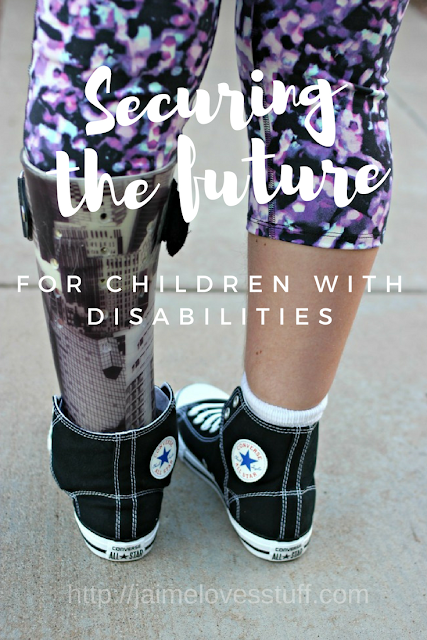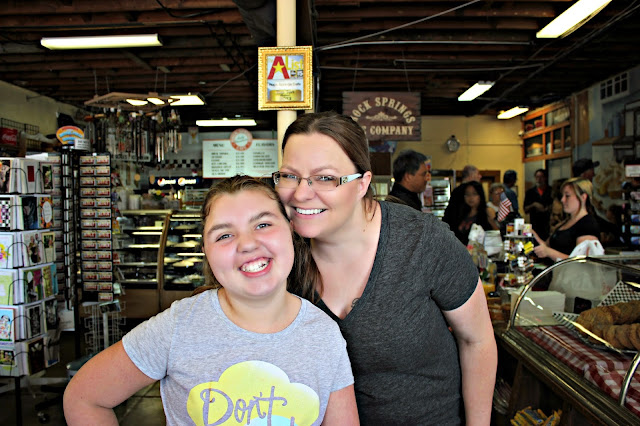 |
| This post was written by me on behalf of ABLEnow, but as always, my thoughts and opinions are my own. |
Raising a child with disabilities is not for the faint of heart.
As parents, we are their voices and advocates.
We become master researchers when it comes to a diagnosis, medication, procedure, and specialists.
We have learned to fight insurance companies, navigate government programs and attend IEP meetings.
We have cried many nights and laughed with unadulterated joy.
We have witnessed setbacks and gains.
We exhaust ourselves by becoming master networkers and experts. For most of us, we wouldn't have it any other way.
However, one of the scariest parts of raising a child with disabilities is securing their future. This is the one thing that literally keeps me up with sleepless nights.
Now that my daughter is in high school, the reality is she will be an adult... SOON. As a single parent, I carry every single worry about her future on my shoulders and this is something I have worried about since the day she was brain injured. I am talking about sick with worry.
What will happen to her when I pass away? What about her financial future? Will she ever live independently? Will she be able to get a job? Will she live in a group home? Stay at home? Will there be adult day programs available? Will she be safe? What about guardianship? How can I protect her?
These are worries that are so different than most parents realize. Nothing reminds you of the fragility of life when you start worrying about who will take of your child when you become sick or die. This is a reality.
However, these are things that can start being planned for NOW.
1. Financial Future
One of the most worrisome is money. Medicaid and SSI (Supplemental Security Income) are two of the most important programs for her future. Unfortunately, SSI doesn't pay very much and Medicaid's coverage for dental and vision become limited once she becomes an adult. SSI limits money you're allowed to save (max $2,000) or have coming in and if you go over, say goodbye to assistance. I am going to be frank- when I pass away, my daughter won't be on the streets.
There IS a way around it with an ABLEnow account.
ABLEnow is absolutely spectacular because this allows people with disabilities to achieve greater independence, financial security and a better quality of life. As I said above, a person with disabilities could not save or invest without jeopardizing benefits. These benefits (Medicaid and SSI) are critical to their health and wellbeing.
The money saved in an ABLEnow account can pay for a variety of qualified disability expenses that are related to being able to maintain health, independence, and quality of life. Such qualifying expenses are housing, transportation, and living expenses.
An ABLEnow account can be opened and managed online. ABLEnow is one of the fastest-growing ABLE programs in the country with accounts in all 50 states. Not all states have an ABLE program but that doesn't mean you have to wait for one to open an account! Also, it's free to start an ABLE savings today with ABLEnow.
This is seriously the GREATEST thing to happen for families with members with disabilities. I literally cried when the ABLE Act was passed. (Thank you, advocates!)
Be sure to watch this video about ABLEnow:
ABLEnow Introduction from ABLEnow on Vimeo.
Make sure you visit the FAQs on the ABLEnow website to answer all the questions I know you have. Also, I suggest visiting the ABLE National Resource Center.
2. Guardianship
Since my daughter is in her teens, I have a better idea of how profound her brain injury really is and how limited she is with her ability to take care of herself. I have been talking to advocates at a disability resource group about the pros and cons of guardianship. I know that will be the route I will go- I will become her guardian when she becomes a legal adult. This means I will still be able to help her with medical, financial, and legal decisions. I will need to appear before a judge annually but this will be the best route for her.
Talk to parents, advocacy groups, social workers, support coordinators, doctors, and other professionals about whether obtaining guardianship over your adult child will be the best route to go.
3. Last Will and Testament.
I tell you, I have been working on mine and it feels quite gothic. BUT at 39 years old and with a child who will always need care, I have to do it and do it now. My sister just passed away a few months ago and the reality of it hit me hard. She was only 7 years old than me.
I am seriously outlining my wishes for her future. Who will be allowed to take care of her? I am working on her binder which includes her entire medical history, behavioral, doctors, her government programs, medications, my life insurance policies, where I want her to live, etc. I am overwhelmed but honestly, this needs to be done. This is also why I was over the moon excited about ABLEnow. I can help ensure her future financial security after I am long gone.
4. Adult Day Programs
When she's 17, I am going to be pushing for her to get enrolled in an adult day program. We have incredible day programs here in Phoenix (Soooo lucky!). I want her to stay active, social and BUSY. Adult programs can end up having waitlists and so early planning can help alleviate the stress of finding a program.
Early planning is essential in securing a stable future.
It makes my heart melt.
Don't forget to talk to parents, research, talk to health care providers and research, research, research.
And most importantly, open an ABLEnow account! NOW!
How are you preparing for your child’s future? Have you opened an ABLEnow account?
What is your biggest concern about your child’s future?
This is a sponsored post written by me on behalf of ABLEnow.








No comments
Thank you so much for saying hello! I love your comments.